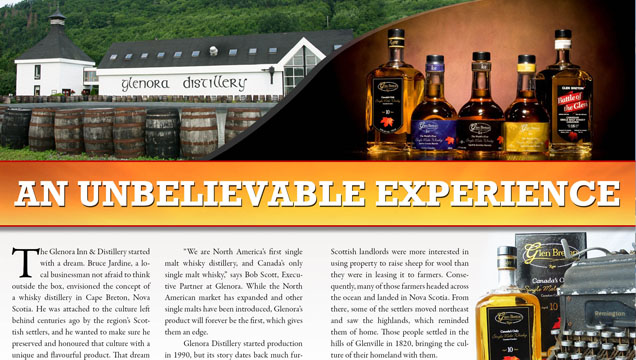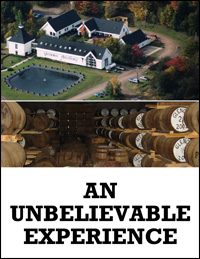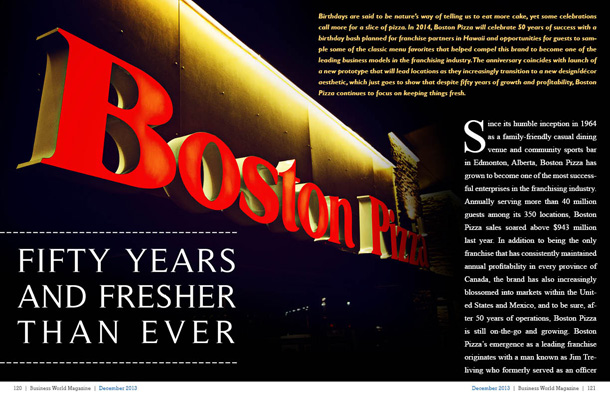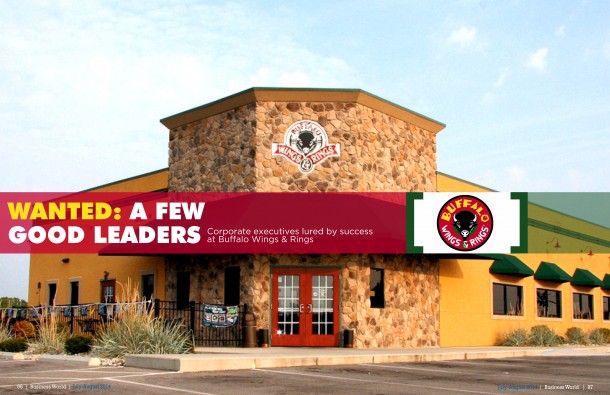
An unbelievable experience
The Glenora Inn & Distillery started with a dream. Bruce Jardine, a local businessman not afraid to think outside the box, envisioned the concept of a whisky distillery in Cape Breton, Nova Scotia. He was attached to the culture left behind centuries ago by the region’s Scottish settlers, and he wanted to make sure he preserved and honoured that culture with a unique and flavourful product. That dream has since become a reality, and Glenora has made history on the back of it.
“We are North America’s first single malt whisky distillery, and Canada’s only single malt whisky,†says Bob Scott, Executive Partner at Glenora. While the North American market has expanded and other single malts have been introduced, Glenora’s product will forever be the first, which gives them an edge.
Glenora Distillery started production in 1990, but its story dates back much further, all the way to when Cape Breton was first settled in the early 1800s. At that time, Scottish landlords were more interested in using property to raise sheep for wool than they were in leasing it to farmers. Consequently, many of those farmers headed across the ocean and landed in Nova Scotia. From there, some of the settlers moved northeast and saw the highlands, which reminded them of home. Those people settled in the hills of Glenville in 1820, bringing the culture of their homeland with them.
“What happened is that Bruce Jardine had this dream of preserving the heritage and culture of the Scottish settlers,†recounts Scott. “So he and group of businessmen went to Scotland to discuss a single malt whiskey distillery with some of the folks there. Those meetings turned out very well, and they purchased Scottish copper pot stills, a mash tun, and three wooden washbacks – the sorts of things that are part of the production process.â€
When deciding where to place the distillery, Jardine and his partners had over a dozen options. They eventually settled on Glenville because of its history, as well as its proximity to MacLellan’s Brook, a stream of water that comes from the highlands above the distillery and flows right through the property. “From what we understand, it’s one of the purest, cleanest waters in North America,†Scott says. Glenora owns 600 acres of land around the property so as to best protect MacLellan’s and their other water supplies.
During the first few years, Glenora struggled with cash flow. In 1994, however, Scott’s group – led by Bedford businessman Lauchie MacLean – took over the operation and turned it around. Scott reports that the passion MacLean had for the business and its product was similar to Jardine’s. “That passion ran over into the employees and into the whiskey making process,†Scott says. “Lauchie was very adamant in making sure we produced a world class single malt.â€
Glenora’s product is known as a single malt whisky because alcohol can only be called Scotch if it is produced in Scotland. That difference, however, did not stop the Scotch Whisky Association (SWA) from trying to prevent Glenora from using the name Glen Breton Rare for their product, claiming it would mislead the public into thinking it was Scotch whisky. Glenora’s lawyer David A. Copp, however, successfully won the ensuing legal battle – an impressive achievement considering the size and influence of the SWA.
In the midst of that battle, Glenora launched their first product into the market. “It was a huge success,†Scott says.  “We sold over 3,000 cases of our production into the marketplace in less than five months. So there started to be demand for our rare single malt.â€
That impressive demand was validated by the success Glenora achieved in a number of different contests throughout the year. A notable example of that success occurred in 2007, when Glen Breton Whiskey was rated in the Top 50 Spirits in the World by Wine Enthusiast Magazine, an acclaimed New York publication. That designation stirred a lot of interest both nationally and internationally, and led the way for Glenora to start selling their product across Canada, the United States, Europe and most recently Asia – a market they are keen to expand further into.
Another significant example of the company’s awards success is the international awards they have won for Glen Breton Ice, the world’s first single malt whisky aged in ice wine barrels. At the San Francisco World Spirits Competition, for instance, that innovative product took home a Silver Medal.
Unfortunately, Jardine himself passed away in 1999, just before the product launch in 2000. “I never met him, but I would have liked him,†Scott says. “He was a visionary. He would have been very proud, as we are, of the dream we helped he and his family realise.â€
A hidden gem
Though enormously successful, Glenora remains a small company with roughly 35 employees. In addition to the distillery side of the business, they also have a hospitality component – the Glenora Inn. The Inn includes nine rooms, six chalets, as well as a pub and dining room. The dining room is an acclaimed one, having been highly rated in Where to Eat in Canada, the bestselling independent guide to Canadian restaurants from coast to coast. “We’re very proud of that part of our operation as well,†says Scott.
As an extension of their distillery business, Glenora also conducts tours. “We open our doors for visitors from Mid-May till the last week of October,†Scott says. “While there, folks have an opportunity to buy rare products at our gift shop that are not sold into the marketplace in volumes.†The tour component of their business is very successful, with Glenora attracting over 10,000 visitors a year. “There’s a huge interest in that market,†Scott says.
In addition, Glenora offers private labelling for companies and individual customers, a practice they are interested in expanding further in the future. “We’re always looking for unique packaging and ideas as to how to further promote our product line,†Scott explains. Moving forward, he says Glenora will continue to look for new opportunities in packaging as well as product development. One of the potential products they are investigating at the moment, for instance, is a whisky flavoured lacquer.
The most important part of the Glenora business model, however, is the sense of culture they seek to preserve and project. When Jardine founded the company over twenty years ago, some of the cultural aspects he was most excited about showcasing were things like the Gaelich language, and fiddle music. The Glenora of today has held true to those ideals, and even expanded on them. During tour season, for example, they have daily kitchen parties. “People come and they can relax, enjoy a glass of Glen Breton, listen to the fiddle players and piano players, and really catch that Scottish feeling,†Scott says.
At Glenora Inn & Distillery they are not just selling whisky, they are selling an experience. “Visitors that come to Glenora leave with this amazing memory,†Scott says. “We’re in Glenville, in a glen, and the view is unbelievable. It’s such a safe, beautiful, quiet experience.†That quality is what attracts so many people to the company, and to their distillery itself. According to Scott, their visitors cannot help but be swept up in the serene and storied atmosphere. “If you came here, you would feel the aura of that distillery – it has that with it,†he says. “When you see it, you can’t believe it. That’s rare. It’s rare that people in this day and age can find such a magnificent property. It’s like a hidden gem.â€
The Glenora property, in addition to being beautiful, is also what accounts for the unique flavour of their product. Glenora Distillery is located in an apple orchard area amongst a natural stand of maple trees, which lends an apple taste to their single malt whiskey. “Our whiskey has what we call a burst of flavour development on the finish,†Scott explains. “It’s unbelievable, the taste just lingers. You can almost taste a touch of maple and butterscotch and honey in our product, and people recognise that and they get all excited when they touch our whiskey compared to other single malts.â€









